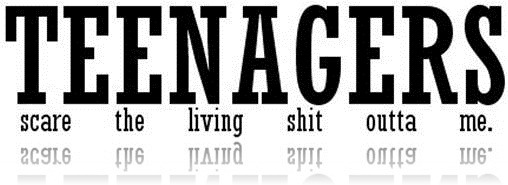
In the past, people thought that teens’ behavior during the teenage years was directly connected to physical changes they start to experience at the age of 12, which makes them feel strange with their body changes and confuses them.
Today, the approach is that adolescence is a more gradual process that starts with the first time children want to try doing things on their own, sometime as early as the age of 3.
If teenagers seem confused to you, it is mainly because they have reached a point in their life when they need to define who they are, what they think, what they like or hate, what their beliefs are and what they wants to be later on in life. These thoughts are tough. I know many adults who have not reached that self-definition yet, so this is not easy for a 12-year-old to do, although they are expected to have some clue about it.
One of the problems parents have with their kids is that they do not really understand what is so confusing about life. It is mainly because they forgot their thoughts and feelings during that time in their own life. Some parents have erased these thoughts when they no longer had to deal with them. Some consider their own teen behavior as criticism towards their parents and avoid dealing with it. Only the brave parents keep these memories to make sure they will not repeat their parents’ “mistakes”.
Around the age of 10, beliefs that were part of children’s identity are shattered and they need to put the pieces together to survive emotionally. Kids with high emotional intelligence can do that, but most cannot, so they have to ask for help from those who unintentionally create the problem – their parents or their teachers.
This series will give you a sneak peek into teens’ confused brain and help you understand why it is so hard do be a teenager. I still remember my adolescence, I am raising my second teen, the third one is reaching puberty soon and I have worked with lots of teenagers in the last 25 years, so this list is quite reliable.
Following each belief and confusing thought, there is a section explaining the source of the belief and showing what parents can do to help their teenagers change that thought or belief and go through a healthy maturing process.
Schools is not for me

What parents can do
It is very important throughout your kids’ school life not to repeat this mantra to children and to be honest about the reasons they go to school. Kids go to school because parents cannot teach them by themselves or do not want to do it.
Some of what happens at school is great, some is boring and some is not about preparing kids for life. When talking to your child about it, admit that you understand some of it is just a waste of time and help your kids focus on the good that can still come out of going to school.
All my kids have always gone to school for the breaks, for the fun days and for the extracurricular activities (band, dance, sport, etc). Still, they are all very good students. When they complained about school, we said, “You’re right, this is a waste of time”, “Yeah, I used to hate it too” or “I agree, you will probably never need that after school”.
Allow your teens to hate parts of their schooling and they will not blame you for sending them to prison. Help them see the good parts of school too. Positive focus and honesty are two of the best ways to prepare them for life.
Don’t tell me what to do
“My parents humiliate me and make me do things I hate doing. How would they feel if I told them to go to bed early or clean the house? I’m not their slave. What if someone grounded them for a week every time they didn’t do the right thing? They don’t love me. I hate them.”
What parents can do

Teenagers who feel controlled by their parents do not understand that parents and children are not equal and that parenting comes with responsibility. Usually, this is a sign that the home is parent-centered and that is not comfortable for the child. Although no home should be completely child-centered, there is a place in between where parents set a good example for helping and they expect things from their kids that they also expect from themselves.
If you are angry with your child for not clearing the table after a meal while you are in another room watching TV, the child will resent you and question your leadership. Be a role model and remember that the need for control is seen by teenagers as a sign of weakness (which is an accurate observation).
I hate my brother/sister
“My big sister is my greatest enemy. She has way more rights than me. She shouts, she take things away from me, she hits me and because she is stronger, she cheats, but Mom and Dad do nothing about it. They love her more than they love me. I hate her and I hate them.”
What parents can do
A home cannot be a jungle where kids need to survive. It needs to be a place of comfort and not a place of fear. When there are conflicts between siblings, parents are not kings and queens that rule the house. They are those who make justice.
Sibling rivalry is a sign that the family rules are not clear, which leaves room for power struggles.
Preferring one child over another because of age (“He’s young, give him what he wants” or “He’s the eldest, so he has rights”), because of ability (“Shhh, we want to hear her sing”), because of disability (“He can’t do it, just help him”) or because of gender (“He’s a boy, so he can go out and nothing will happen to him, but you’re a girl, so going to a party is much more dangerous for you”) is a form of discrimination. It sends the message that the rules are not stable – they can change.
This is scary situation, because not everyone understands what is right and what is wrong and where the boundaries are. Only the parents can solve it, so make sure the rules are fair and clear!
Will she like me too?

What parents can do
Teaching kids about the natural physical and emotional changes can help greatly in situations like this. Treating this period in life as a normal and healthy period can make life much easier for teenagers.
Ask your daughter when she wants to go together to get her first bra before she asks for it. Tell her about what to expect when she gets her period before she comes to you in panic after hearing the other girls talk. Teach your son how to shave. Celebrate hair in new places and changes in the voice.
If you feel uncomfortable talking about these things, get someone else you trust to do it. It is better if they hear it from you or from someone you trust than from other kids who have lots of fear and misunderstanding about these changes. Remember, when you avoid talking about puberty and sexual development, you make your teens think there is something wrong or dirty about it.
Talk to your teenagers about your first love to help them understand it is natural. Talk to them about disappointment and love you did not get in return to help them understand that the adults in their life have experienced these things and survived.
The topic of peer pressure is something that needs to be addressed from a very early stage of your child’s schooling. What others think about you is theirs and it is not healthy to let them pressure you to do or not do things. It is important for kids to gain confidence and trust themselves and their own judgment and every time they are subject to peer pressure, they shrink their own judgment and become weaker.
Parents don’t know everything
“I think dad is not as smart as he says he is. Last week, when I talked to him about something, he talked as if he knew everything, but I knew he didn’t, because we’d learned about it at school. Maybe there are many things he doesn’t know and he only talks about them in this “I’m smart and I know everything” tone. How can I trust him?”
What parents can do
Some parents talk in a way that seems very confident to their kids, as if they know everything. Parents like to be in this position and when it changes, they feel a bit helpless and try to maintain their know-it-all image for fear that kids’ knowing more than them creates a risky relationship.

To prevent your teens from feeling they cannot trust you, be honest even when they are younger. If they ask you something you do not know, say simply, “I don’t know”. If there is anything they can do better then you, ask for their help. It is better for them to realize there are things you do not know from as early as possible. It saves them this very common shock later and strengthens your bond with them.
Join me next week for another sneak peek into teens’ mindset and ways for you to understand and help them change their thoughts in a positive way.
Happy parenting,
Ronit
This post is part of the series Troubled Teens:
- Troubled Teens: Confusing Years
- Troubled Teens: Disturbing Thoughts
- Troubled Teens: Scary Times
- Troubled Teens: Terrible Times
No posts found








